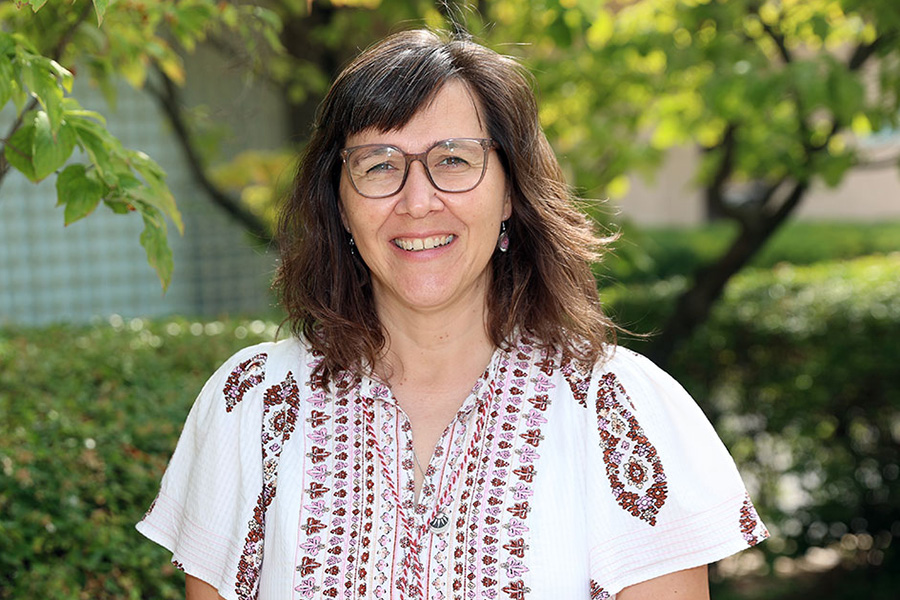Vesna Cotić Costello named interim chair of the Department of Occupational Therapy
by Mark Lambert
September 06, 2023

Occupational therapy (OT) has been part of the academic curriculum at Radford University since 2009, and Vesna Cotić Costello, D.H.Sc., was there when the first cohort of students walked through the door.
One of the original four faculty members hired to teach those early OT students the ropes, this fall she leads the department she helped kickstart all those years ago – in the role of interim department chair.
“I’m the last one standing,” Costello chuckled, noting that the last of her original colleagues retired this year. “I felt a bit of a calling to reflect on my own history here at Radford University, where we have been as a department – where we may want to go in the future and what opportunities a leadership role may offer.”
Having witnessed the program’s evolution from its beginning to where it stands now, her first thought was amazement at how much growth and change the OT department had undergone, especially in the recent past.
First, there was the 2019 merger of Jefferson College of Health Sciences (JCHS) into Radford University, which brought the associate and master’s OT programs offered at the Roanoke location into the department. JCHS was owned and operated by healthcare giant Carilion Clinic, so the culture of the programs was different. It would take time to integrate the new students and faculty into the Radford OT department.
Then, just as the OT programs began to effectively mesh, a major speed bump stopped the world in its tracks: the COVID pandemic. At the time, Costello served as the OT department’s academic fieldwork coordinator, a role she had been in since 2014, where she helped students find clinical placements for hands-on experiences as part of their coursework.
“During the pandemic, I placed students in clinical sites across the United States and interacted with both OT students and their clinical supervisors across many different clinical settings, Costello recalled. “I was the bridge between clinical practice and education and it helped me see how all of the different people involved were affected, including students, clients and practitioners.”
She thinks the pandemic had a major impact on occupational therapy and how it is practiced. Because she had a front-row seat to it all, Costello says she learned several lessons she hopes to take with her into her new role.
“The pandemic taught us that OT can be taught and practiced under unimaginable conditions, and that it offers a place where those that we serve can reimagine a future, despite the world falling apart around them, literally and figuratively.”
Costello also noted that the pandemic changed her understanding of teaching and serving. “What I saw as we came out of the pandemic was greater grace, forgiveness and humility toward ourselves and others,” she notes. “I want to take this humility and grace into leadership. I believe it can be a catalyst for meeting the needs of students, clients and faculty because it gives everyone permission to learn and serve at their own pace, encourages risk-taking and facilitates dreaming.”
The American Occupational Therapy Association (AOTA) says occupational therapy enables people of all ages to participate in daily living and defines occupations as the activities that people do every day to give their life meaning and purpose.
Costello believes that as a result of the pandemic, that broad definition can be broadened even further to encompass areas that hadn't traditionally been thought of as part of OT.
“The pandemic required us to expand our thinking as to what makes life meaningful and whose needs we want and need to teach our students about, responding to a changing world,” Costello noted. “For example, what are the needs of moms postpartum who gave birth during the pandemic, or international students on campus who were isolated from their families many miles away?”
The idea of occupational therapy serving beyond the clinical environment has been a long-standing tradition in the OT program, Costello noted. “Since the pandemic, we have embraced our tradition,” she said. “Our students gain the skills needed to serve in ways and in settings that are guided by changing needs and a desire to enable meaningful lives, no matter where they are.”
Costello says that in both healthcare and education, change is constant and something to be expected. Yet, she says, it can also be embraced; change can lead to good and wonderful things.
“One of the things that I think is so neat about our department is that we started in 2009, and we were the new kid on the block,” Costello remembers. “Not just here at Radford University, but in Virginia at the time. All of our faculty are both clinicians and educators. So, there has always been an understanding about what’s needed in a clinical or community setting now and what will be needed in the future.”
Costello herself is continuing to grow as well by expanding her own knowledge. In May, she earned her doctorate in health sciences from the Radford University Carilion Department of Public Health and Healthcare Leadership. In combination with her work experience, her recent student experience will make her a unique academic leader at Radford.
“The opportunities are endless in both occupational therapy and in education,” she says. “If you put those two together, it’s limitless as to what we can imagine and do. I like to envision and paint the future, so I find it exciting to be overseeing a large department in two locations. We have an incredible faculty of dedicated occupational therapists and educators. My job is to enable them to tap into their strengths and lead them in a focused direction with grace and humility for all of us.”